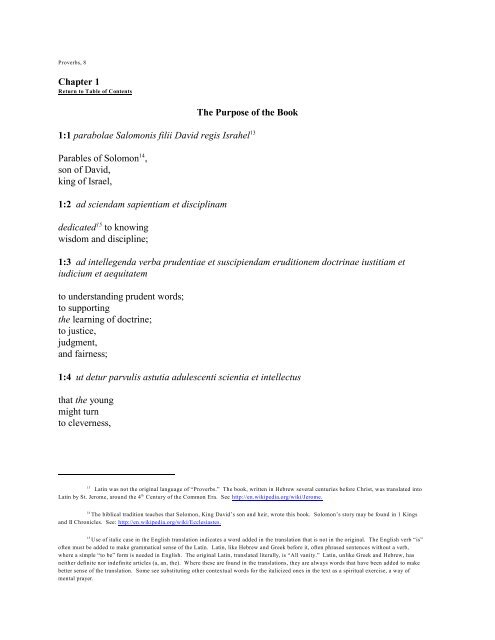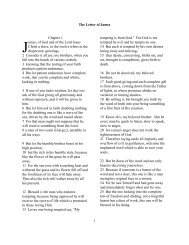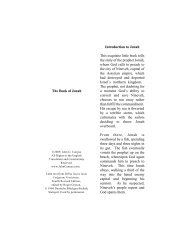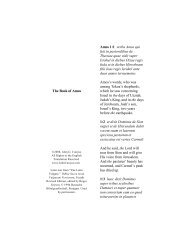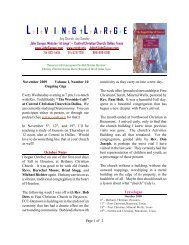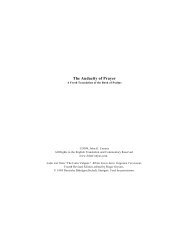- Page 1 and 2: Table of Contents Proverbs Scriptur
- Page 3 and 4: other books. Later, he decided that
- Page 5 and 6: The Song of Wisdom Chapter 1 Chapte
- Page 7: Proverbs, 7 Solomon’s life opens
- Page 11 and 12: 1:15 fili mi ne ambules cum eis pro
- Page 13 and 14: and neglected my warnings. 1:26 ego
- Page 15 and 16: Chapter 2 Return to Table of Conten
- Page 17 and 18: Those who relinquish a fair-minded
- Page 19 and 20: Chapter 3 Return to Table of Conten
- Page 21 and 22: for whom the Lord delights in, he c
- Page 23 and 24: Then, you will walk faithfully in y
- Page 25 and 26: 3:35 gloriam sapientes possidebunt
- Page 27 and 28: from the words of my mouth. 4:6 ne
- Page 29 and 30: unless they are causing others to f
- Page 31 and 32: Chapter 5 Return to Table of Conten
- Page 33 and 34: to reproofs? 5:13 nec audivi vocem
- Page 35 and 36: Chapter 6 Return to Table of Conten
- Page 37 and 38: A Useless Man 6:12 homo apostata vi
- Page 39 and 40: that they may keep you from an evil
- Page 41 and 42: Chapter 7 Return to Table of Conten
- Page 43 and 44: now outside, now in the streets, no
- Page 45 and 46: Now, therefore, son, hear me, and a
- Page 47 and 48: ‘My throat will meditate on truth
- Page 49 and 50: ‘My fruit is better than gold and
- Page 51 and 52: ‘I was with him, ordering all, an
- Page 53 and 54: Chapter 9 Return to Table of Conten
- Page 55 and 56: will be added to you. 9:12 si sapie
- Page 57 and 58: Chapter 10 Return to Table of Conte
- Page 59 and 60:
The mouth of the fair man is a vein
- Page 61 and 62:
will come upon him; the fair-minded
- Page 63 and 64:
Chapter 11 Return to Table of Conte
- Page 65 and 66:
One who disdains his friend lacks h
- Page 67 and 68:
others carry off what is not their
- Page 69 and 70:
Chapter 12 Return to Table of Conte
- Page 71 and 72:
Who works his land will be satisfie
- Page 73 and 74:
Proverbs, 73 12:20 dolus in corde c
- Page 75 and 76:
Chapter 13 Return to Table of Conte
- Page 77 and 78:
Rapid wealth will waste away, but t
- Page 79 and 80:
The good leave behind inheritances,
- Page 81 and 82:
is manifest. 14:5 testis fidelis no
- Page 83 and 84:
The innocent believe every word; th
- Page 85 and 86:
14:26 in timore Domini fiducia fort
- Page 87 and 88:
Chapter 15 Return to Table of Conte
- Page 89 and 90:
the way; one who hates rebukes will
- Page 91 and 92:
his mother. 15:21 stultitia gaudium
- Page 93 and 94:
of the eyes makes the soul happy; a
- Page 95 and 96:
By mercy and truth treachery is bou
- Page 97 and 98:
than gold, and acquire prudence bec
- Page 99 and 100:
16:26 anima laborantis laborat sibi
- Page 101 and 102:
Chapter 17 Return to Table of Conte
- Page 103 and 104:
One correction counts more to the p
- Page 105 and 106:
17:20 qui perversi cordis est non i
- Page 107 and 108:
Chapter 18 Return to Table of Conte
- Page 109 and 110:
The name of the Lord is a strong to
- Page 111 and 112:
his belly will be filled, and what
- Page 113 and 114:
will not escape. 19:6 multi colunt
- Page 115 and 116:
sleep, and a careless soul will hun
- Page 117 and 118:
a fool will be wiser, but if a wise
- Page 119 and 120:
he will beg in summer and nothing w
- Page 121 and 122:
20:15 est aurum et multitudo gemmar
- Page 123 and 124:
It is ruin to man to devour holy th
- Page 125 and 126:
Chapter 21 Return to Table of Conte
- Page 127 and 128:
21:10 anima impii desiderat malum n
- Page 129 and 130:
Proverbs, 129 21:20 thesaurus desid
- Page 131 and 132:
there is no prudence, there is no c
- Page 133 and 134:
one guarding his soul will back far
- Page 135 and 136:
the Lord is angry with will fall in
- Page 137 and 138:
38 at the gate , 22:23 quia Dominus
- Page 139 and 140:
Chapter 23 Return to Table of Conte
- Page 141 and 142:
Do Not Harm the Harmless 23:10 ne a
- Page 143 and 144:
of those who bring food to disputat
- Page 145 and 146:
and practice draining cups? Proverb
- Page 147 and 148:
Chapter 24 Return to Table of Conte
- Page 149 and 150:
If you say, ‘Strength is not suff
- Page 151 and 152:
my son, and the king, and do not mi
- Page 153 and 154:
the building and the retaining wall
- Page 155 and 156:
y fairness. Don’t Put on Airs 25:
- Page 157 and 158:
will be appeased by patience, and a
- Page 159 and 160:
from a distant land. 25:26 fons tur
- Page 161 and 162:
Respond to a fool, according to his
- Page 163 and 164:
and labors, to see if he can bring
- Page 165 and 166:
speaks sofly, do not believe him, b
- Page 167 and 168:
The blows of the loving are better
- Page 169 and 170:
A broken roof on a cold day and a q
- Page 171 and 172:
for you will not have strength fore
- Page 173 and 174:
do not consider fairness, but those
- Page 175 and 176:
28:15 leo rugiens et ursus esuriens
- Page 177 and 178:
something away from his father and
- Page 179 and 180:
29:5 homo qui blandis fictisque ser
- Page 181 and 182:
and even correction will teach wisd
- Page 183 and 184:
in the Lord will be lifted up. 29:2
- Page 185 and 186:
Who secured the wind in his hands?
- Page 187 and 188:
30:12 generatio quae sibi munda vid
- Page 189 and 190:
Proverbs, 189 30:20 talis est via m
- Page 191 and 192:
30:31 gallus succinctus lumbos et a
- Page 193 and 194:
lest, perhaps, he drink and forget
- Page 195 and 196:
31:16 zai consideravit agrum et emi
- Page 197 and 198:
31:28 coph surrexerunt filii eius e
- Page 199:
Scripture from The Latin Vulgate Jo


